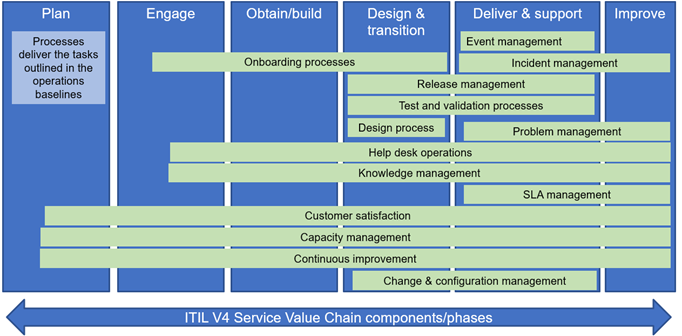The Value of Service Processes for Cloud Managed Service Providers (MSPs)
Barry Turner
Senior Consultant, ISSI

ISSI works with partners across a spectrum of business models who want to become cloud-managed service providers. Within that ecosystem are two types of partners who can face a stumbling block on the way to becoming MSPs: cloud native partners and resellers. Their challenge? They don't have service processes in place—the established, documented, and repeatable policies, processes, and procedures that enable consistent service quality and high customer satisfaction.
It's an issue because the major cloud vendors require proof that a partner has implemented those processes. Let's look a bit closer into why this happens, and what partners can do about it.
Cloud-native companies are generally oriented towards agile processes that don't mesh well with systematic processes—what company management might view as excessively bureaucratic procedures. For example, I've done consulting work with a cloud-native company that's built a highly successful business based on the excellent technical skill sets of its founders and employees. They are natural coders who use an ultra-agile approach with most projects based on sprints. When they reach a certain size and employee count, they spin off new business units to maintain a high rate of business growth. But then the company started encountering challenges. There was not enough coordination between the business units. They lacked systematic processes and cross-company communications. Efforts to take customers through the life cycle of services were disjointed, which created problems not just for their continued growth, but also with customer relations.
Now let's look at resellers. I've worked with resellers who have built highly profitable companies. A licensed solution provider (LSP) that I've consulted for created a high-margin business reselling Microsoft licenses into the corporate world. However, reselling licenses does not require the service management skills and infrastructure required to get MSP certified. This partner did not understand how to execute managed services or why they needed things like incident and release management capabilities. Without that process infrastructure and skills in place, they were not ready to become an MSP. The company's first two steps on the journey to becoming a certified MSP were to implement ISO27001:2013 and ISO20000:2018, which provided the process foundation for the successful delivery of cloud-managed services.
ITIL and ISO 20000 Provide a Solid Foundation
Companies looking to build a sound service processes system to become cloud MSPs should look to ITIL (Information Technology Infrastructure Library) and ISO 20000. Of these two, ISO 20000 certification is less common, and is typically used by large organizations to provide demonstrable proof of the quality of their service processes to customers. The ISO 20000 certification applies to the organization, and is an externally audited process that the company must go through. Individual practitioners becoming certified to conduct the audit or prepare companies for the audit. I'll focus here on ITIL, which is more relevant to cloud-native partners and resellers seeking guidance on how to implement process services.
ITIL is a framework that describes processes, procedures, tasks, and checklists that are used to support business strategies, deliver value, and maintain a minimum level of competency. First developed by the Central Computing and Telecommunications Agency in Britain in the late 1980s, it is used to help organizations establish a baseline for demonstrating compliance to industry standards and for measuring how they maintain and improve on those standards over time.
ITIL certification is only for the individual practitioner and does not apply at the organizational level. Because of this, there are no formal, independent third-party evaluations that provide company-wide certifications. Instead, individual practitioners can be certified in ITIL at several levels of experience and expertise. This is beneficial to individuals who can demonstrate their knowledge of ITIL-recommend processes and procedures. Businesses that have employees with ITIL certification can leverage this in conversations with customers, and they will often encourage employees to become ITIL-certified as part of their professional development.
The ITIL V4 Framework
The ITIL V4 value chain defines six sets of activities: Planning, engaging, obtaining/building, design and transition, delivery and support, and improvements. Within these is a matrix of individual processes that a partner needs to implement to become a cloud MSP. The diagram below maps the processes required to become a cloud MSP against the six sets of activities:

It can appear daunting at first glance, and the different MSP requirements of the respective cloud vendors add additional layers of complexity. However, putting these processes in place is essential for a successful cloud-managed service provider operation.
Over the long term, the effort that goes into developing sound service processes results in a range of benefits, all of them supporting business growth. The business benefits that accrue from implementing a set of service management processes can be summarized as:
- Improved customer retention is generated by providing customers with consistent quality service.
- A business scales more rapidly when new employees become operationally effective in a shorter time scale due to the framework of clearly documented processes.
- A long-term reduction in the cost of operations and improved service quality is created with automation. Automation is critical to a cloud MSP and results in a reduction in labor costs, a reduction in human errors, and a security improvement. Documenting processes is the first step in identifying efficiencies and service improvements such as automation.
To learn how ISSI can help your company evaluate its readiness to implement service processes, visit
Alternatively, please contact sales@issi-inc.com
Additional Articles
Building a solid strategy for becoming a cloud managed service provider
Barry Turner, ISSI Head of Global Marketing & Senior ConsultantCloud Management Platforms: A Core Component in Growing Your Managed Services Business By Amarnath Gutta, Senior Consultant, ISSI In our work with partners through workshops,
Project Plan Vs. Success Plan Vs. Adoption Plan
Jonathan Lee, ISSI Customer Success Practice LeadProject Plan Vs. Success Plan Vs. Adoption Plan There are differences and this is when to apply them By Jonathan Lee – ISSI Customer Success
Building blocks of a customer success practice
Jonathan Lee, ISSI Customer Success Practice LeadBuilding Blocks of a Customer Success Practice By Jonathan Lee – ISSI Customer Success Practice Lead Customer Success Practice Blog Series #3 As mentioned in
- 06 FEB 2024
The ways that partners can make money
Barry Turner, Senior Consultant, ISSIThe Ways That Partners Can Make Money By Barry Turner - Senior Consultant, ISSI One of the questions that ISSI hears from the cloud vendors
04 DEC 2024Leveraging the Power of the Well-Architected Framework
Barry Turner, Senior Consultant, ISSIThis blog will provide an overview of the Well-Architected Framework (WAF), the benefits it delivers, and how to start using it. I will also briefly discuss the role of the WAF in conjunction with the Cloud Adoption Framework.
29 MAY 2025Developing a CA Score to Identify Your Best Customer Advocates
Jonathan Lee, ISSI Customer Success Practice LeadCustomer advocacy is the act of building and nurturing relationships with loyal customers, who then act as spokespeople and champions for your brand, products, or services. This process starts by identifying who those loyal customers are. To pinpoint your customer advocates, look for happy customers who frequently use your products or services in innovative ways and see a big impact on their business as a result.
